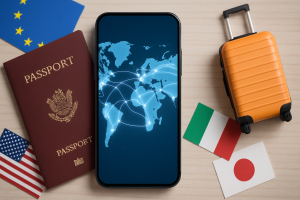Travel FAQ – Domestic & International Trips

Faq: Questions and Answers
How and when should I book transportation and accommodations for domestic or international trips?
Aim to book domestic travel—such as flights, trains, or buses—2–3 months in advance, and international trips 4–6 months ahead, especially for high-demand seasons. Compare prices across platforms like Skyscanner, Booking.com, Airbnb, and Expedia to find the best deals, and always double-check cancellation policies before finalizing.
- Faq: Questions and Answers
- How and when should I book transportation and accommodations for domestic or international trips?
- What documents do I need for domestic and international travel?
- How can I prepare for health and safety, including COVID-19 and other travel-related risks?
- What should I do about money and currency exchange?
- How do I ensure connectivity abroad—phone, internet, and navigation?
- What safety precautions should travelers take at home and abroad?
- What are the key emergency numbers for European travel?
- How can I plan a flexible travel itinerary that balances must-see sights and spontaneity?
- What packing strategies work best for both short and long trips?
- How do I minimize jet lag and culture shock?
What documents do I need for domestic and international travel?
For domestic trips, a valid government-issued photo ID (ID card or driver’s license) is usually enough. For international travel, you’ll need a passport valid for at least 6 months beyond your return date, plus any required visas or electronic travel authorizations (e.g., ESTA, eTA). Keep printed and digital copies of your passport, visa, health documents, travel insurance, and accommodation bookings.
How can I prepare for health and safety, including COVID-19 and other travel-related risks?
Monitor official health advisories for your destination (e.g., WHO, CDC). Schedule any necessary vaccinations 4–6 weeks before travel and pack a basic travel health kit with prescription medications, pain relief, motion sickness remedies, and hand sanitizer. Purchase travel insurance that covers medical emergencies, trip interruptions, and COVID-related costs. Research local emergency numbers and healthcare facilities beforehand.
What should I do about money and currency exchange?
Inform your bank of your travel to prevent card blocks. Choose travel-friendly cards with low international fees (like Wise, Revolut, or N26) and bring some local currency for immediate expenses. Use local ATMs at your destination for better rates, and always have a backup payment method (credit card or emergency cash).
How do I ensure connectivity abroad—phone, internet, and navigation?
Decide between keeping your existing number on an international roaming plan or purchasing a local SIM or eSIM (Airalo, Holafly). Download essential travel apps before departure—WhatsApp, Google Maps offline, Maps.me, and Google Translate. Consider a VPN for secure access to your online accounts and browsing on public Wi-Fi.
What safety precautions should travelers take at home and abroad?
Pre-trip, secure your home by unplugging appliances, pausing mail delivery, and arranging pet care. Register your trip with your embassy for crisis support. Learn key local customs, laws, and cultural norms. Make a safety checklist including emergency contacts, embassy information, and local emergency numbers (e.g., 112 in Europe, 911 in the U.S.).
What are the key emergency numbers for European travel?
Save these essential numbers for your travels across Europe:
– 112 – Universal EU emergency number (all EU countries)

– UK – 999 or 112

– France – 112 or 15 (Medical), 17 (Police), 18 (Fire)

– Germany – 112 (Medical/Fire), 110 (Police)

– Italy – 112 or 118 (Medical), 113 (Police), 115 (Fire)

– Spain – 112 or 061 (Medical), 091 (Police), 080 (Fire)
– Netherlands, Sweden, Portugal – 112
– Switzerland – 112 or 144 (Medical), 117 (Police), 118 (Fire)
– Austria – 112 or 144 (Medical), 133 (Police), 122 (Fire)
– Belgium – 112 or 101 (Police)
How can I plan a flexible travel itinerary that balances must-see sights and spontaneity?
Research attractions, local events, recommended restaurants, and transport in advance, and create a rough daily plan using tools like Google My Maps. Prioritize 2–3 major activities per day, leaving space for serendipitous discoveries. Booking popular experiences early can save time, but don’t over-schedule—some of the best memories come from unplanned moments.
What packing strategies work best for both short and long trips?
Choose versatile clothing layers tailored to the climate, pack travel essentials (power adapter, reusable water bottle, compact rain gear), and keep valuables in your carry-on. Weigh your luggage to avoid fees. Use packing cubes to organize and keep items tidy, and bring a portable charger to stay powered up on the go.
How do I minimize jet lag and culture shock?
Adjust your sleep schedule to your destination’s time zone a few days before departure. Stay hydrated on the flight, avoid excessive caffeine or alcohol, and expose yourself to daylight upon arrival. Keep open-minded, flexible, and give yourself a recovery day before diving into busy sightseeing—culture shock often fades after a few days.

Question: What documents do I need for domestic flights?
For domestic flights, you typically need a government-issued ID such as a driver’s license or national ID. Always check the airline’s requirements. See the TSA ID requirements for domestic travel for more details.
Question: Do I need a passport for international travel?
Yes, you need a valid passport for international travel. Many countries require at least six months of validity remaining on your passport. Check the passport validity rules for international travel.
Question: How early should I arrive at the airport for a domestic flight?
It’s recommended to arrive 1.5 to 2 hours before a domestic flight to allow time for check-in and security clearance.
Question: What should I do if I miss my connecting flight?
If you miss your connecting flight, go to your airline’s service desk immediately. They will help rebook you on the next available flight.
Question: Can I travel with an expired passport?
No, an expired passport is not valid for international travel. Renew it before your departure to avoid any issues.
Question: Do children need identification for domestic flights?
Yes, depending on the airline, children may need identification such as a birth certificate or a school ID.
Question: What should I pack for an international trip?
Pack essential items including travel documents, clothing suitable for the climate, toiletries, medications, and electronics with adapters.
Question: Is travel insurance necessary for international travel?
While not required, travel insurance is highly recommended to cover unexpected events like trip cancellations, lost baggage, or medical emergencies.
Question: Can I bring medication on a plane?
Yes, medications are allowed in carry-on bags, but bring them in original packaging and carry a prescription if necessary.
Question: What’s the difference between a direct and a nonstop flight?
A nonstop flight travels from origin to destination without stops. A direct flight may stop but doesn’t require you to change planes.
Question: What are the baggage allowances for international flights?
Baggage allowances vary by airline and ticket class. Generally, you’re allowed one checked bag and one carry-on. Check with your airline.
Question: Are there any restrictions on carry-on luggage?
Yes, carry-ons must meet size and weight limits and cannot contain prohibited items like liquids over 100ml or sharp objects.
Question: Can I use my mobile phone abroad?
You can use your phone abroad if it’s unlocked and compatible with local networks. Consider buying a local SIM card or an international plan.
Question: How do I exchange currency while traveling?
Currency can be exchanged at airports, banks, or exchange offices. ATMs often offer competitive rates, but check for fees beforehand.
Question: Do I need a visa to travel to certain countries?
Visa requirements depend on your nationality and destination. Check the destination country’s consulate website for up-to-date information.
Question: What vaccinations are recommended before international travel?
Vaccination requirements vary by destination. Common ones include Hepatitis A and B, Typhoid, Yellow Fever, and COVID-19. Consult a travel clinic.
Question: How can I stay safe while traveling internationally?
Stay aware of your surroundings, keep valuables secure, avoid risky areas, and register with your embassy if needed.
Question: What should I do if I lose my passport abroad?
Report the loss immediately to the local police and contact your embassy for a replacement or emergency travel document.
Question: Can pregnant women travel by air?
Yes, pregnant women can usually travel until around 36 weeks, but a doctor’s note may be required. Check airline policies in advance.



